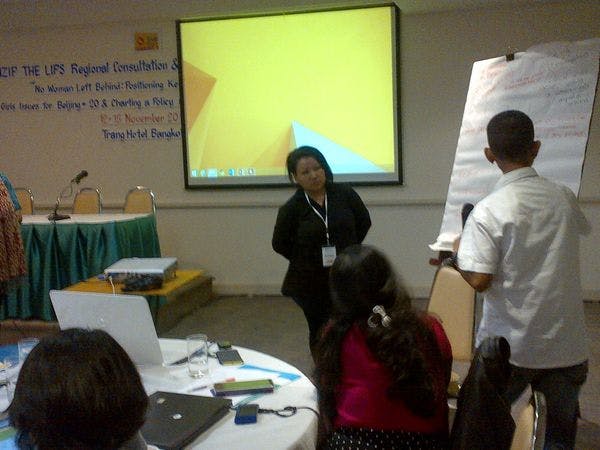‘Unzip the lips’ of women who use drugs in Asia
This week I joined a group of women to work on putting together key policy advocacy messages in the lead up to the Asian and Pacific Conference on Gender Equality and Women’s Empowerment: Beijing +20 Review being held next week in Bangkok—at an Unzip the Lips workshop. The participants came from all over the region, including the Philippines, India, Nepal, China, Indonesia, Australia and Papua New Guinea. We each had a focus on a particular community, for example migrants, transgender people, sex workers, people living with HIV and women who use drugs, but we were all concerned about issues relating to the services, laws and policies relevant to the women and girls most vulnerable to HIV-related risks.
Ms. Nini Pakma, Vice-President of the Indian Drug Users Forum, spoke about the stigmatisation and barriers to access to women who use drugs, live with HIV and do sex work, such as violence against women and girls, discriminatory practices within the judicial and law enforcement system, and early and forced marriages. She spoke about the need to protect and ensure the sexual and reproductive health rights of women and girls, as well as the provision of women-specific harm reduction services in India.
Hailing from Nepal, where she set up the first NGO by and for women who use drugs in 2006, known as Dristi Nepal, its President Ms. Parina Subba Limbu highlighted the problem of the multiple stigma faced by women who use drugs (who are regarded as criminals), do sex work and live with HIV, especially in cultural contexts where women are already heavily discriminated against, which in turn create serious barriers to accessing social and health services and assistance. Other problems faced by women who use drugs are criminalisation, incarceration, forced drug treatment, violence by families and partners, low service coverage of harm reduction and other health services which are not gender-sensitive, all of which have deleterious effects on the health of women who use drugs in the region.
Together we decided a priority problem to focus our advocacy on is the absence or lack of involvement of girls and women in policy and decision making processes at national and international levels. If problems such as multiple stigma could be overcome and women and girls can ‘unzip their lips’ and make their voices heard in decision making processes, they could make important steps to winning back their rights to health, dignity and a decent quality of life.
Keep up-to-date with drug policy developments by subscribing to the IDPC Monthly Alert.
Related Profiles
- International Drug Policy Consortium (IDPC)
